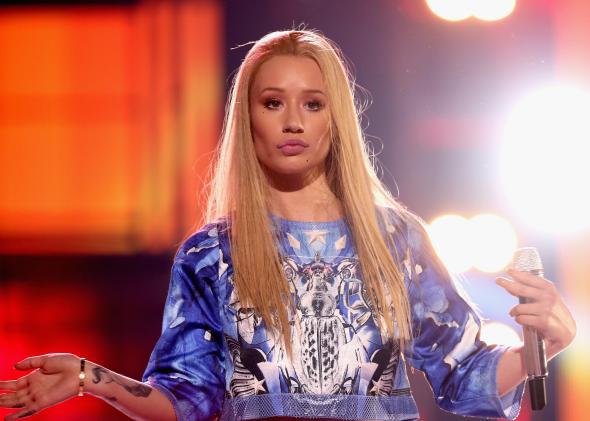This article originally appeared in Vulture.
Now that the Iggy Azalea bubble seems to have finally burst, the most amazing thing about her is that she ever existed at all. The recent cancellation of her national tour, the second time it’s been delayed, could signal the beginning of the end for Iggy—though there’s also this recent damning Iggy-themed entry to the “Me/You” meme, which pretty much perfectly sums up her current dilemma (and also unfortunately recalls these two young ladies). She just canceled an appearance at Pittsburgh Pride after backlash over racist and homophobic tweets. Her single “Trouble,” with Jennifer Hudson, peaked at No. 67 on Billboard’s Hot 100 and spent only one week on the chart. “Pretty Girls,” her recent collaboration with Britney Spears, peaked at No. 29 (it’s currently at No. 45); meanwhile, this week last year, Azalea had the No. 1 song in the country with “Fancy.” As for the “Pretty Girls” video, which plays like “Friday” made by famous people, it probably seemed like a brilliantly canny idea at the time—Britney gets some juice from the Britney manqué of the moment (hey, it worked for Jennifer Lopez), while Iggy gets to appear with what passes for a legend these days—but now it seems like a serious miscalculation. Much in the way that Iggy Azalea, as a musical entity, must have seemed like a brilliantly canny idea once upon a time but now seems like an obviously terrible idea.
When Azalea first appeared—for many, likely, her introduction came through this 2011 New York Times story, which predated her hits by several years—she was remarkable for seeming simultaneously improbable and inevitable: a statuesque, blonde, white, female Australian rapper. As such, Azalea loomed like a music marketer’s tween-courting dream, even as she ran contrary to every received notion of authenticity in hip-hop. Was she a quantum leap forward for what was possible in the genre, or a blatant bit of cynical packaging? Was she Elvis, or, on the other hand, was she Elvis? Like any quantum event, much of the answer depended on who was doing the observing. Not that she found many champions, but she certainly found success. By the time she released “Fancy” last year, you might have thought, Well, of course the pretty white rapper would stick. Soon she was guest-versing on everyone’s summer songs, appearing on SNL, and, apocalyptically, getting nominated for a Grammy for Best Rap Album.
Only since then has the story taken an unexpected turn, which was perhaps the most expected turn of all, which is that the body of hip-hop, and popular music on the whole, has risen up to reject this particular transplant. Her SNL appearance was so disastrous that the show wound up parodying it later in the same season. (If you’re of a certain age, there’s no way you can watch this awkward dancing, high-school-musical staging, and varsity-jacket styling and not think of Vanilla Ice. And that wasn’t even the number for which her co-performer penned a handwritten letter of public apology.) And there’s the unending avalanche of corrosive accusations: that Azalea affects a “blaccent”; that she uses ghostwriters; that she can’t freestyle or, for that matter, actually rap. The internet now hosts an entire subgenre of Iggy-spitting-gibberish reaction videos.
It’s ironic that the final Iggsplosion comes concurrently with the recent news that Degrassi: The Next Generation, the Canadian TV series, is coming to an end (or, as with all undead shows, moving to Netflix). Degrassi once boasted the teenage talents of rap’s other most inevitable, most improbable, and now arguably biggest star: Drake. It may be difficult to remember now that Drake is so popular that he’s inspired arguments over whether he’s the greatest rapper ever and an entire app that texts only his lyrics, but he once seemed as unlikely as, well, Iggy Azalea: A half-Jewish former child-star from a middle-class family in Canada. Drake, too, faced lots of early questions around authenticity, as well as about his rapping ability (we shall never speak again about hashtag rap)—but unlike Azalea, he’s leaned so hard into those criticisms that he’s ingeniously turned them into an asset. Hip-hop has always loved a defiant underdog, so Drake flipped the script, casting himself an underdog in the face of the doubts raised by his biography. The rapper who most evidently didn’t start from the bottom put out a song titled “Started From the Bottom,” complete with a lengthy interstitial video sketch about his high jinks while working at a Canadian drugstore chain. Whereas rappers once boasted about defying the expectations of the world, Drake boasts about defying the expectations of hip-hop.
Could Iggy Azalea turn a similar trick? For starters, Drake is good at rapping and getting better, while Iggy is bad at rapping and getting worse, so the prognosis on that front is not great. But Azalea likely has a more promising artistic future as someone who embraces her own contradictions —who defiantly flips the bird at her critics rather than attempting to appropriate their accents. The only new song I ever want to hear from Iggy Azalea is the one about the strange experience of being an overly packaged white Australian woman who’s not a great rapper trying to make it in hip-hop. (In the SNL parody, Iggy intros a track as being about “my roots”—then unleashes a song called “Money Ass.”) In a weird way, Azalea’s unconflicted admission about her own cosmetic surgery is the most authentic thing she’s ever done. She will likely never rebound as a phenomenon, but she could at least try to rebuild herself as something resembling an artist.
See also: Iggy Azalea Cancels Pittsburgh Pride Performance After Allegations of Homophobia
